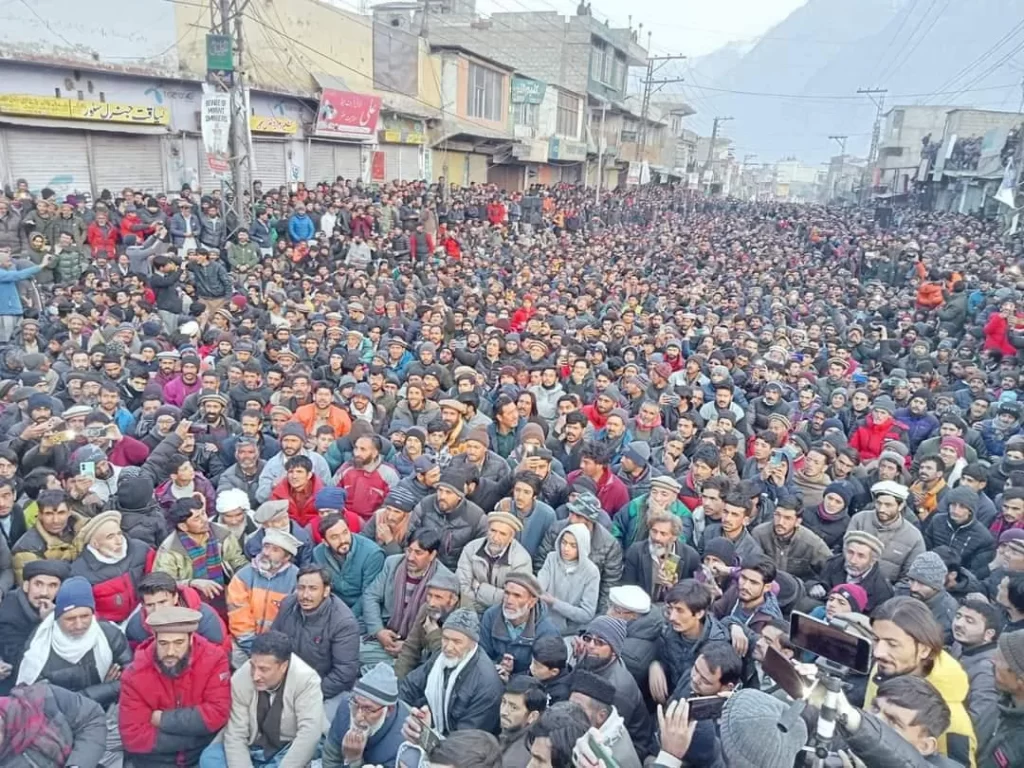By Syed Ahmed Ali Shah
Nestled within the formidable embrace of the Himalayas, Gilgit-Baltistan unfolds its narrative against a backdrop of rugged mountains that echo the tales of centuries-old endeavors and victories.

This region, intricately tied to the larger Kashmir issue, has evolved into a crucible of complexities where geopolitical intricacies shape the destinies of its inhabitants. Beyond the towering peaks and deep ravines, the people of Gilgit-Baltistan find a common bond in their collective pursuit of fundamental rights. Amidst the diverse fabric of religious and regional distinctions, a harmonious melody rises as the community unites in vocal advocacy.
Recent protests and impassioned sit-ins, reminiscent of historical movements, further illuminate the quest for justice in the heart of Gilgit-Baltistan. The palpable energy of the protests draws attention to pressing concerns, notably the continuity of essential subsidies, particularly wheat, which has become a symbol of socio-economic resilience. As the region stands at the crossroads of historical legacies and contemporary struggles, the resonating call for equitable rights reverberates across the valleys, signifying a profound and dynamic societal movement that not only transcends geographical confines but also challenges the status quo, demanding a reevaluation of the region’s place within the broader national discourse.
In the last week of January, residents of Hunza, Nagar, Skardu, Ghazar, and Yasin initiated a lengthy march toward Gilgit. Furthermore, reports indicate that rallies from various regions of Gilgit-Baltistan are also converging in Gilgit. Over the past month, continuous protests have swept through Gilgit-Baltistan, with Skardu alone experiencing a persistent demonstration for the last 32 days. The entirety of Gilgit-Baltistan came to a standstill on January 26 and 27, marked by widespread shutter-downs and traffic blockades in protest. Substantial demonstrations and rallies were organized across all districts to articulate the collective concerns of the populace.
Amidst the protest against the escalation in subsidized wheat prices and other grievances, a widespread disruption unfolded, causing the suspension of traffic and the closure of shops, markets, restaurants, and commercial centers in various regions, including Gilgit, Skardu, Diamer, Ghizer, Astor, Shigar, Ghanche, Kharmang, Hunza, and Nagar. The normal rhythm of daily life was significantly disrupted. The repercussions of the strike were keenly felt, with reduced attendance observed in both private and government offices, along with a notable decline in educational institutions, primarily due to the unavailability of transport. Consequently, the populace faced challenges in commuting and accessing essential commodities during this period of turmoil.
The speakers expressed their unwavering commitment, declaring their steadfast presence with a clear statement that reverberates through the history of 76 years. Their determined resolve demands nothing less than a sovereign Gilgit-Baltistan, characterized by distinct features. The momentum of this movement is noticeable, as extensive rallies converge from various corners of Gilgit-Baltistan, gathering in Gilgit city for a significant protest. The Awami Action Committee (ACC) has emphasized the seriousness of this dissent, announcing a comprehensive two-day pause in regular activities and the closure of businesses across the ten districts of Gilgit-Baltistan, highlighting the importance and widespread support for their call for autonomy.
Author: Syed Ahmed Ali Shah – Muslim Youth University, Islamabad, MS International Relations scholar. His research focuses on Pakistan-China-India-US triangular strategic relations in the 21st century. His research area also includes studies on South Asia, extremism and terrorism, foreign policy of great powers, and Gilgit-Baltistan studies. He writes in World Geostrategic Insights, Modern Diplomacy, Parliament Times, Daily Country News, and NewsMart.
(The views expressed in this article belong only to the author and do not necessarily reflect the views of World Geostrategic Insights)







